|
|
|
Sort Order |
|
|
|
Items / Page
|
|
|
|
|
|
|
| Srl | Item |
| 1 |
ID:
123400
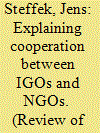

|
|
|
|
|
| Publication |
2013.
|
| Summary/Abstract |
The ever closer collaboration between intergovernmental organisations (IGOs) and non-governmental organisations (NGOs) is empirically well described but poorly theorised. In this article I develop a general theoretical framework for analysing emergent patterns of cooperation between IGOs and NGOs, which may be used to generate hypotheses or guide comparatives studies. The starting point is a conception of organisational actors as purposeful but resource-dependent. The article then combines a 'resource exchange perspective' from organisational sociology with the model of a policy cycle from comparative politics. The result is a theoretical framework that allows to identify incentives for, as well as obstacles to, IGO-NGO cooperation along all phases of the policy cycle. In a concluding section the limits of this model and the underlying assumptions are discussed.
|
|
|
|
|
|
|
|
|
|
|
|
|
|
|
|
| 2 |
ID:
123398
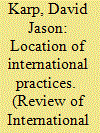

|
|
|
|
|
| Publication |
2013.
|
| Summary/Abstract |
This article opens up space to challenge state-centrism about human rights practice. To do so, it presents and critically assesses four methods that can be used to determine who and/or what counts as a part of any international practice: the agreement method, which locates a practice by referring to speech acts that define it; the contextual method, which locates a practice by referring to the actions, meanings, and intentions of practitioners; the value method, which locates a practice by identifying a value or principle that the practice reflects or instantiates; and the purpose method, which locates a practice by constructing an account of the sociopolitical reason(s) for a practice's existence. The purpose method, based on an interpretation of Rawls' constructivism, is developed, in a way that focuses on practitioners' judgement-based reasons to assign responsibility for human rights to any state or non-state actor.
|
|
|
|
|
|
|
|
|
|
|
|
|
|
|
|
| 3 |
ID:
123401
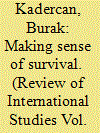

|
|
|
|
|
| Publication |
2013.
|
| Summary/Abstract |
The assumption that 'states' primary goal is survival' lies at the heart of the neorealist paradigm. A careful examination of the assumption, however, reveals that neorealists draw upon a number of distinct interpretations of the 'survival assumption' that are then treated as if they are the same, pointing towards conceptual problems that surround the treatment of state preferences. This article offers a specification that focuses on two questions that highlight the role and function of the survival assumption in the neorealist logic: (i) what do states have to lose if they fail to adopt self-help strategies?; and (ii) how does concern for relevant losses motivate state behaviour and affect international outcomes? Answering these questions through the exploration of governing elites' sensitivity towards regime stability and territorial integrity of the state, in turn, addresses the aforementioned conceptual problems. This specification has further implications for the debates among defensive and offensive realists, potential extensions of the neorealist logic beyond the Westphalian states, and the relationship between neorealist theory and policy analysis.
|
|
|
|
|
|
|
|
|
|
|
|
|
|
|
|
| 4 |
ID:
123382
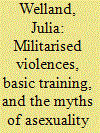

|
|
|
|
|
| Publication |
2013.
|
| Summary/Abstract |
In recent years numerous reports of prisoner abuse and other militarised violences by British troops stationed in Iraq and Afghanistan have emerged. Drawing on two such incidents - the abuse of detainees at Camp Breadbasket and the murder of Baha Mousa - this article seeks to locate such violences on a continuum that can be traced back to the ways in which British soldiers are trained. Following on from a burgeoning feminist literature on militarised masculinities, and using Avery Gordon's epistemology of ghosts and hauntings, I suggest a conceptual and methodological intervention into the subject that resists generalised stories and the mapping of 'hard' borders. Focusing on the myths of asexuality and discipline that emerge from, and reinforce, the gendered discourses of basic training, I conduct a 'ghost hunt' of the haunting spectres that have attempted to be exorcised from these myths. Making visible these ghost(s) and tracing their (violent) materialisations through multiple sites and across a continuum, militarised violences - in all their ranges - begin to be made explicable.
|
|
|
|
|
|
|
|
|
|
|
|
|
|
|
|
| 5 |
ID:
123351
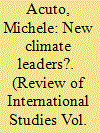

|
|
|
|
|
| Publication |
2013.
|
| Summary/Abstract |
Little interest has thus far been paid to the role of cities in world politics. Yet, several are the examples of city-based engagements suggesting an emerging urban presence in international relations. The Climate Leadership Group, despite its recent lineage, is perhaps the most significant case of metropolitan intersection with global governance. To illustrate this I rely on Actor-Network Theory (ANT) to develop a qualitative network analysis of the evolution of the C40 in the past seven years from a limited gathering of municipal leaders to a transnational organisation partnering with the World Bank. Pinpointed on the unfolding of a twin diplomacy/planning approach, the evolution of the C40 can demonstrate the key role of global cities as actors in global environmental politics. These cities have a pivotal part in charting new geographies of climate governance, prompting the rise of subpolitical policymaking arrangements pinpointed on innovative and hybrid connections. Yet, there remains some important rational continuity, in particular with neoliberalism, which ultimately limits the revolutionary potential these cities might have for international relations.
|
|
|
|
|
|
|
|
|
|
|
|
|
|
|
|
| 6 |
ID:
123347


|
|
|
|
|
| Publication |
2013.
|
| Summary/Abstract |
Critics of global democracy have often claimed that the social and political conditions necessary for democracy to function are not met at the global level, and are unlikely to be in the foreseeable future. Such claims are usually developed with reference to national democratic institutions, and the social conditions within national democratic societies that have proved important in sustaining them. Although advocates of global democracy have contested such sceptical conclusions, they have tended to accept the method of reasoning from national to global contexts on which they are based. This article critiques this method of argument, showing that it is both highly idealised in its characterisation of national democratic practice, and overly state-centric in its assumptions about possible institutional forms that global democracy might take. We suggest that if aspiring global democrats - and their critics - are to derive useful lessons from social struggles to create and sustain democracy within nation states, a less idealised and institutionally prescriptive approach to drawing global lessons from national experience is required. We illustrate one possible such approach with reference to cases from both national and global levels, in which imperfect yet meaningful democratic practices have survived under highly inhospitable - and widely varying - conditions.
|
|
|
|
|
|
|
|
|
|
|
|
|
|
|
|
| 7 |
ID:
123393
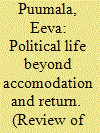

|
|
|
|
|
| Publication |
2013.
|
| Summary/Abstract |
This article explores political agency in the interstices of the bodily politics of asylum. It shows how its practices make bodily surfaces and how alternative forms of political authority emanate from bodies. Relying on Jean-Luc Nancy's ontology of the body, it examines forms of political agency that are enacted by people often considered as abjective subjectivities in the spaces of the international. Deriving from interviews conducted with failed asylum seekers, the article sheds light on agencies and resistances embedded in and extant despite the governmental efforts to solve the problem of the moving body. Ethnographic data and interviews with the failed asylum seekers show how they take control over their lives, not as separate, sovereign subjects, but in relation to their political surroundings and others. In a way, the failed asylum seekers produce and practice their own politics that both takes part in and exceeds the limits set by sovereign politics. By exploring political agency from underneath and beyond sovereign power and governmentality, the article presents a reading of the intertwining of the international, political, and bodily.
|
|
|
|
|
|
|
|
|
|
|
|
|
|
|
|
| 8 |
ID:
123390


|
|
|
|
|
| Publication |
2013.
|
| Summary/Abstract |
What can critical geopolitics contribute to an understanding of the political dynamics of humanitarianism within International Relations? This article demands a reconsideration of the concept of humanitarianism by examining the spatial ordering of international society and the geopolitics of international law that condition our understanding of humanitarian agency and conduct within IR. The focus on critical geopolitics seeks to identify the normative structure of humanitarianism and how humanitarian claims - which are seemingly universal - are constituted through specific geopolitical discourses that structure agency and conduct within international life. Considering how humanitarianism is discursively structured as a geopolitical concept involves taking humanitarianism beyond its methodological privileging of impartiality, neutrality, and universality in making sense of humanitarianism. Critical humanitarianism does not accept the grounding of humanitarianism within an intuitive moral framework but instead locates humanitarian agency and conduct within a spatialised understanding of the international system. Such a spatialised ordering of humanitarianism takes the analytical focus away from 'saving strangers' (Wheeler) and 'global conscience' (Linklater) towards a consideration of the ways in which international law is the product of historical particulars that reflect a complex political sociology of the state (Schmitt).
|
|
|
|
|
|
|
|
|
|
|
|
|
|
|
|
| 9 |
ID:
123355
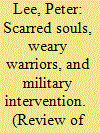

|
|
|
|
|
| Publication |
2013.
|
| Summary/Abstract |
Over the past three decades Jean Bethke Elshtain has used her critique and application of just war as a means of engaging with multiple overlapping aspects of identity. Though Elshtain ostensibly writes about war and the justice, or lack of justice, therein, she also uses just war a site of analysis within which different strands of subjectivity are investigated and articulated as part of her broader political theory. This article explores the proposition that Elshtain's most important contribution to the just war tradition is not be found in her provision of codes or her analysis of ad bellum or in bello criteria, conformity to which adjudges war or military intervention to be just or otherwise. Rather, that she enriches just war debate because of the unique and sometimes provocative perspective she brings as political theorist and International Relations scholar who adopts, adapts, and deploys familiar but, for some, uncomfortable discursive artefacts from the history of the Christian West: suffused with her own Christian faith and theology. In so doing she continually reminds us that human lives, with all their attendant political, social, and religious complexities, should be the focus when military force is used, or even proposed, for political ends.
|
|
|
|
|
|
|
|
|
|
|
|
|
|
|
|
| 10 |
ID:
123349
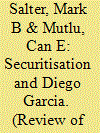

|
|
|
|
|
| Publication |
2013.
|
| Summary/Abstract |
To advance the on-going debate on Securitisation Theory (ST), we argue that the important questions of audience and attention can be addressed through careful historical study. In an analysis of the securitising moves concerning the American military base on Diego Garcia, we are able to demonstrate that the Copenhagen and Paris Schools are not methodologically incompatible, and empirically that public attention for security issues has a tendency to dissipate without continual discursive investment.
|
|
|
|
|
|
|
|
|
|
|
|
|
|
|
|
| 11 |
ID:
123389


|
|
|
|
|
| Publication |
2013.
|
| Summary/Abstract |
China's increasing capabilities are a central focus of modern day US security concerns. The International Relations literature is a key forum for analyses of the so-called 'China threat' and yet it remains relatively quiet on the role of ideas in the construction and perpetuation of the dangers that country is understood to present. This article reveals that throughout history 'threats' from China towards the United States, rather than objectively verifiable phenomena, have always been social constructions of American design and thus more than calculations of material forces. Specifically, it argues that powerful and pervasive American representations of China have been repeatedly and purposefully responsible for creating a threatening identity. It also demonstrates that these representations have enabled and justified US China policies which themselves have reaffirmed the identities of both China and the United States, protecting the latter when seemingly threatened by the former. Three case studies from across the full duration of Sino-American relations expose the centrality of ideas to historical and contemporary understandings of China 'threats', and to the American foreign policies formulated in response.
|
|
|
|
|
|
|
|
|
|
|
|
|
|
|
|
|
|
|
|
|